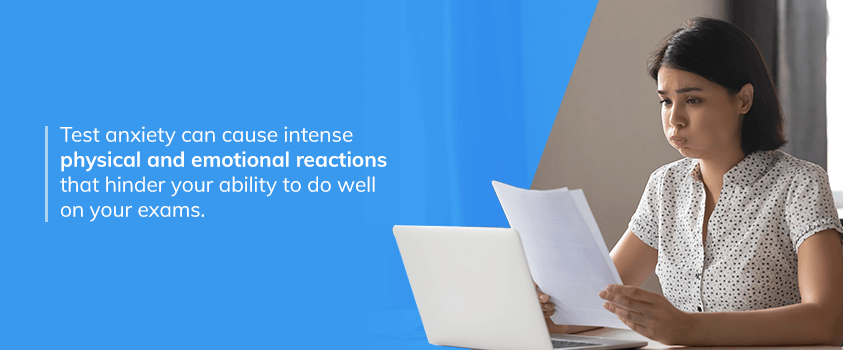How to Manage Medical School Test Anxiety
Exam anxiety is something that nearly every student goes through at some point. Test anxiety can creep up at any time, but it can especially be an issue for medical students. Thankfully, you can practice ways to overcome the test anxiety that comes with the stress of attending med school. This guide will help you understand the causes and symptoms of test anxiety and offer several tips on calming test anxiety. With these tips, you can calm your mind before you even pick up your pencil and tackle the first question of your test.
What Is Test Anxiety?
It is common to feel a little anxious before taking any test. A bit of nervousness before a test can even be helpful, as it aids in focusing your attention. However, some students can experience test anxiety on an entirely different level. Test anxiety can be considered a type of performance anxiety, as medical students have a tendency to put incredibly high expectations on themselves to exceed at everything. Test anxiety can cause intense physical and emotional reactions that hinder your ability to do well on your exams. This leaves medical students feeling miserable and helpless, no matter how much they study.

What Are the Symptoms of Test Anxiety?
Symptoms of test anxiety can reveal themselves in three main ways: physical, emotional and cognitive or behavioral.
Physical symptoms of test anxiety include:
- Nausea
- Shaking
- Fainting
- Sweating
- Vomiting
- Dry mouth
- Panic attacks
- Increased heart rate
Emotional signs of anxiety are:
- Irritability
- Frustration
- Low self-esteem
- Depressive thoughts
- Feeling overwhelmed and hopeless
Cognitive or behavioral symptoms of anxiety include:
- Negative self-talk
- Trouble focusing and concentrating
- Avoiding studying or testing situations
It is important to note that test anxiety symptoms can range from mild to severe. Some medical students may only experience mild symptoms and can still perform well on their tests as a result. However, other students may suffer from severe symptoms, such as panic attacks, before the exam is even administered.
What Are the Causes of Test Anxiety?
![What Are the Causes of Test Anxiety?[list]](https://www.medlearnity.com/wp-content/uploads/2021/10/02-What-Are-the-Causes-of-Test-Anxiety.png)
To treat med school test anxiety, you need to understand its causes. Medical students often have an increased risk of test anxiety because of the intense and competitive nature of this particular academic environment. There is usually not one sole reason for test anxiety. Rather, test anxiety typically manifests due to several different reasons, including:
- Fear of failure: Many medical students are burdened by their attempts to strive for perfection. These students usually end up tying their self-worth to their test performance.
- Poor testing history: For students who have a poor history of test-taking, every upcoming test can be more and more anxiety-inducing than the last.
- Underlying anxiety: People who already experience general anxiety are more likely to feel anxious when tests are involved. These students may never feel like they’ve studied enough and may have a feeling of dread around the idea of studying and tests.
Tips to Overcome Test Anxiety
At times, it may seem impossible not to feel overwhelmed when it comes to taking tests, especially major exams like the Medical College Admission Test (MCAT) or the United States Medical Licensing Examination (USMLE). Thankfully, you can practice some effective methods for overcoming test anxiety. Here are our top test anxiety tips for students you can use before taking a test:
- Reduce your caffeine intake.
- Regularly take meaningful breaks from studying.
- Get enough hours of sleep the night before the exam.
- Reflect on your identity outside of just being a medical student.
- Make time to practice mindfulness or meditate at least once a day.
- Think about your strengths and reflect on why you chose to become a doctor.
- Get an adequate amount of exercise throughout the week leading up to the exam.
One of the best ways to avoid test anxiety is to prepare in advance by setting aside an appropriate amount of time for studying before the test. Getting support from tutors can be extremely beneficial.
After using these effective strategies to prepare leading up to the test, you can use a different set of exam anxiety tips and techniques to manage your nervousness while taking the test:
- “Skip 10” approach: When dealing with a test that has about 40-50 questions, start with question 11 for each section and work to the end. Then, finish out the remaining 10 questions of the exam. This strategy is a way to trick your mind through the use of time management, so completing the rest of the test seems fairly manageable once you work yourself back to question 1.
- Skip questions you’re not confident about: There is usually a section of a test where you get stuck. Perhaps the wording of the question trips you up, or this particular section deals with material that you wished you would have gone over one more time. Whatever the case, if you encounter a group of questions that you are not confident about, the best method is to skip over the section and come back to it after finishing up the rest of the exam. This technique is useful because it prevents you from wasting time that you could spend answering questions you are more confident about. Skipping questions also stops you from allowing yourself to spend too much time stressing over the fact that you don’t immediately know the answer.
- Remind yourself that your test anxiety is helpful: Changing your mindset can be one of the powerful things you can do to keep your test anxiety from getting the best of you. Some medical students can change their perception and reframe their stress as something that helps them remember and focus on important things during the test. This shift in mindset can help you feel like you have power over your anxiety instead of your anxiety having power over you.
- Remember there are more questions: You should avoid dwelling on questions you are unsure of, especially early in an exam. In many cases, all questions on an exam are weighted the same. Dwelling on a question can increase stress and doubt while making it more difficult to focus. In most cases, you should limit marked questions to go back to be below 10. Even if you are not sure if you got the question right, remember there are other questions you will get right and focus your energy on completing the exam and putting your best foot forward for the next question.
- Limit negative thoughts: While it is easier said than done, you should try not to focus on negative thoughts. Focusing on negative thoughts can cause difficulty thinking clearly and negatively impact your mood and ability to focus. You should also treat this situation as a new experience and avoid taking negative emotions from previous experiences into the session. Focus on the task at hand. Even if you have failed a previous test or session, that does not mean the same will happen during a new session.
- Believe in your abilities: You have studied long and hard for this exam, and you should be proud of the knowledge and experience you have gained. It can increase your confidence if you believe that you can answer these questions and pass the assessment. Some people may find it beneficial to think of the exam as a practice test because this often alleviates stress. Remember that just because a question seems easy, it may be easy to you and not others. If a question seems straightforward, it is because you are well-prepared, and you should be proud of your abilities.
- Use context clues: Regardless of how much you prepare for an exam, you will not know a question or two. If you are unsure, try to notice context clues that can help you determine what the question is looking for. When choosing facts from a question, focus on the ones that help you determine a diagnosis from related answer choices. While nerves are normal, they do not help you. Your instincts are what helps you. Use the information the question provides to make your life easier. Test scenarios generally reference commonly occurring cases, not obscure diseases or treatment procedures.
Start Tutoring With Medlearnity
Test anxiety is something that everyone experiences at some point in their academic career. Although you can’t always prevent test anxiety, the important thing is to find tips and strategies that work for you to overcome it. Medical students are under a considerable amount of stress as they work their way through med school. You can work with an experienced tutor to help you prepare before taking a test. This is a great way to ensure you are physically, emotionally and cognitively in the right frame of mind to overcome your test anxiety. Time management is vitally important in studying, and med school exam tutoring courses can assist you in making the most of your time. Learn more about Medlearnity’s tutoring and test prep services by signing up for our free trial.
